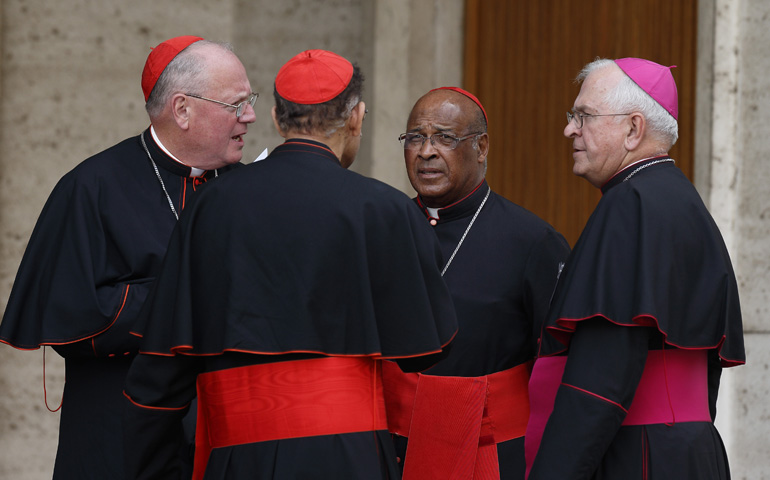
From left: Cardinal Timothy Dolan of New York; Cardinal Oswald Gracias of Mumbai, India; Cardinal Wilfrid Napier of Durban, South Africa; and Archbishop Joseph Kurtz of Louisville, Ky., talk after leaving the morning session of the extraordinary Synod of Bishops on the family Monday at the Vatican. (CNS/Paul Haring)
One of the prelates participating in the Synod of Bishops on the family has sharply criticized the landmark document the meeting released Monday, saying its message of openness to modern society has put the prelates in "a position that is virtually irredeemable."
"The message has gone out: This is what the synod is saying, this is what the Catholic church is saying," South African Cardinal Wilfrid Napier said at a Vatican press conference Tuesday.
"And it's not what we're saying at all," Napier said. "No matter how we try correcting that ... there's no way of retrieving it."
"The message has gone out and it's not a true message," he continued. "Whatever we say hereafter is going to be as if we're doing some damage control."
Monday's document, which calls for the church to listen more and to apply mercy much more widely, was released as a summary of the synod's discussions so far and is known officially as a relatio post disceptationem.
Napier, who heads the archdiocese of Durban in South Africa, also serves as a member of the general council of the Vatican's office for the Synod of Bishops.
Speaking later at the Vatican press conference, Napier seemed to back away from his criticism. Asked if he would want the meeting to rescind the document, he responded: "That's rather radical, I think, because the relatio actually has a lot of very good, very good things."
"It would be like saying, 'Let's take back the words that the synod fathers used in the synod hall,' " he said. "A lot of it is what was actually said."
"Some of the ... dissatisfaction is that individual things that [were] said by individuals ... are put in here as if they really do reflect the feeling of the whole synod," the cardinal continued.
"They've been picked up by the media, then, and been made to be the message of the synod," he said. "I think that's where the upset is."
While Napier's comments Tuesday seemed to evince some wide disappointment with Monday's document, he is one of only a few prelates who have made such disappointment public.
The cardinal also said the synod had not yet addressed the document as an assembly and that he was mainly voicing opinions he had heard in one of the synod's small working groups.
The synod has been meeting in 10 such working groups, divided by language, since Friday. Those groups are to submit revisions and additions to Monday's document for review by the whole assembly Thursday, in view of drafting a final document for submission to Francis at the end of the synod on Sunday.
Another prelate who has publicly voiced disagreement with Monday's document is U.S. Cardinal Raymond Burke, who said in an interview Monday with Catholic News Agency that he hopes the document "will be set aside completely."
The synod members had a chance to discuss Monday's document together after Hungarian Cardinal Péter Erdő, who is serving as the synod's relator, read it aloud that morning.
Following that reading, 41 prelates at the synod made speeches about the text, suggesting additions or changes.
Unlike previous synods, the Vatican is not releasing the texts of the speeches made by the prelates, but a Vatican summary released Tuesday of the 41 prelates' remarks said some had expressed concerns about the document, saying it "may give rise to confusion."
Instead of releasing texts, the Vatican is providing daily briefings with three spokesmen who are attending the synod and summarizing events: official Vatican spokesman Jesuit Fr. Federico Lombardi, in Italian; Chicago archdiocesan Fr. Manuel Dorantes, in Spanish; and Basilian Fr. Thomas Rosica, in English.
Joining the spokesmen Tuesday were Napier and Italian Cardinal Fernando Filoni, who is prefect of the Vatican's Congregation for the Evangelization of Peoples and is participating in the synod in that role.
While Filoni said he had some "surprise" over the amount of media coverage Monday's document received, he also said it was part of a process for preparing a final document for the pope to review.
"I believe that we are working over what emerged over the first week" of the synod, Filoni said, adding that the document is "part of a path" of discussion and consideration.
Referring to the possible additions and subtractions that may come to the document from the synod's small working groups, Filoni said: "There are points of view ... if someone doesn't like it, they can propose something else."
"Someone says it is missing something, another, that it has to add something," he said. "It is right that it might be this way."
Lombardi opened Tuesday's briefing with a clarification from Cardinal Lorenzo Baldisseri, the head of the Vatican's office for the Synod of Bishops, who emphasized that Monday's document is a "working document" and not a final statement from the synod.
The document, Lombardi quoted Baldisseri, is "a discussion of the members of the synod."
[Joshua J. McElwee is NCR Vatican correspondent. His email address is jmcelwee@ncronline.org. Follow him on Twitter: @joshjmac.]
